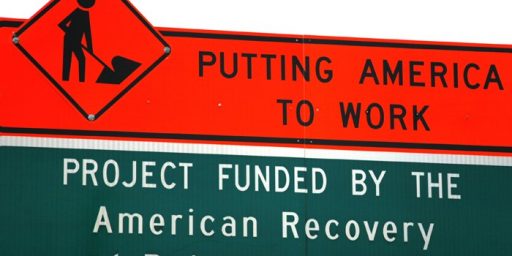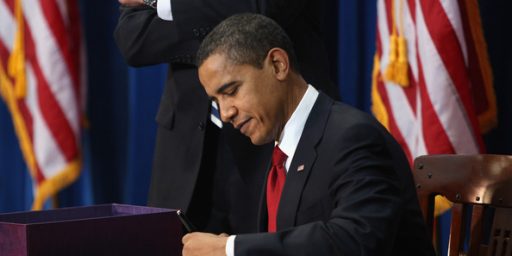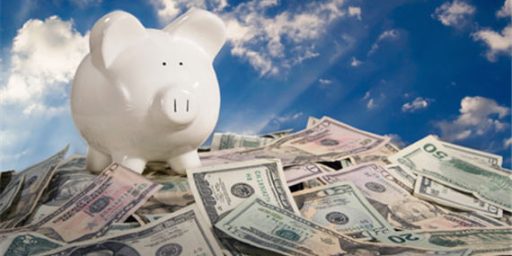The Impact of the Stimulus Bill
The CBO has provided an estimate of the impact of the stimulus bill on GDP and unemployment.
- Raised the level of real (inflation-adjusted) gross domestic product (GDP) by between 1.7 percent and 4.2 percent,
- Lowered the unemployment rate by between 0.7 percentage points and 1.5 percentage points,
- Increased the number of people employed by between 1.2 million and 2.8 million, and
- Increased the number of full-time-equivalent (FTE) jobs by 1.8 million to 4.1 million compared with what those amounts would have been otherwise. (Increases in FTE jobs include shifts from part-time to full-time work or overtime and are thus generally larger than increases in the number of employed workers.)
However there is a problem with this kind of estimation as the CBO notes,
Data on actual output and employment during the period since ARRA’s enactment are not as helpful in determining ARRA’s economic effects as might be supposed, because isolating those effects would require knowing what path the economy would have taken in the absence of the law. Because that path cannot be observed, there is no way to be certain about how the economy would have performed if the legislation had not been enacted, and data on its actual performance add only limited information about ARRA’s impact.
In other words, the CBO’s estimate is done as follows: You develop a macro-economic model of the U.S. economy and run it twice. The first time you run it with the stimulus, the second without. The difference between the two results is your estimate. In other words, the output depends on some of the assumptions in your model, such as assumptions about how stimulus spending impacts the economy.
If you are starting to think, “Wait a minute that sounds suspiciously like circular reasoning….” you might be a right wing kook. If you are thinking that this CBO report shows conclusively that the “Stimulus worked!” you might be a left wing loon.
What the CBO did was look at other studies of various types of fiscal policy to try and determine how large of an effect various elements of the the stimulus bill would be. For example, the point to this article by David Johnson, Johnathan Parker, and Nicholas Soulese on the effects of the 2001 tax rebates on household expenditures. In other words, the CBO looked at other work and from that work, came up with what they thought were reasonable paramters to plug into their model. Using research like that of Johnson et. al., though is not entirely problem free though as that work was seen by their closing comments in the paper,
We conclude by returning to a caveat. While the 2001 tax rebates stimulated consumer spending, without knowing the full structural model underlying these results, we cannot conclude that future tax rebates will necessarily have quantitatively the same effect. The response of spending to tax rebates may differ across time and circumstances. In 2001 the rebates were part of countercyclical stabilization policy, but the response might be smaller outside of a recession or given a different situation for household balance sheets and liquidity. Nonetheless, our results provide a starting point for analyzing the impact of future tax rebates on expenditure.
In other words, it isn’t just the parameter choices that matter, but the underlying structural model of the economy.
The CBO’s estimates are based on macro-economic models of the U.S. economy and rely on other empirical studies as well to come up with a “what if” scenario”. There is no direct data on how many jobs have been created, saved, or how much GDP has gone up due to the stimulus spending.
One of the things that annoys me about the discussions on the efficacy of the stimulus spending is that many conclude that the various estimates that come out are much more grounded in facts that they actually are. The impact of the stimulus is at best difficult to measure if not impossible. It goes back to the rather clever political jujitsu by the Obama Administration in using the claim, “…jobs created or saved…” The latter, jobs saved, is inherently unmeasurable. Based on the official government statistics all you can do is tell what the change in the number of jobs was from one month to the next. You can’t tell how many jobs were “saved”. Even if there was no change and most economists and market watchers expected a decline in employment and there is none, does that mean the stimulus saved jobs? Or is it due to something else like the impact of the recession lessening sooner than was anticipated.
Another question that this type of analysis does not answer is, Was this the best policy for the money we are spending?
For example, the research I linked above indicates that the tax rebates in 2001 had a larger effect than is typically thought. Would a policy with greater emphasis on tax rebates have worked better. Could they have been structured to come in phases with the option of cancelling later phases if the economy is showing growth that is robust enough to limit the rather rapid accumulation in debt?






So what you’re saying is that CBO estimates the impact of stimulus spending to build an economic model, runs a simulation to estimate economic effect of stimulus, then reports what its estimate estimated?
I don’t believe these numbers any more that I believed the more pessimistic ones. This is much more guesswork than most want to admit. I mean, even the “best policy” question, there’s no way that could be answered without a boatload of assumptions. Change the assumptions just a bit, and the “best policy” changes right along with them.
Say you assume GM goes to BK, what do you assume happens next? A smaller GM emerges? One or two viable divisions split? That affects consumer confidence how? It’s fiction. Fiction that becomes a model when these guys get hold of it.
If it is really that good, why don’t we do it every six months?
It’s obviously harsh medicine.
I can’t measure the hodgepodge of the Obama stimulus. I think government money had to be spent to prevent a depression. We keep going over the same failed ideologies from both parties. A tax rebate while ignoring globalization and 2 billion cheap laborers makes no sense. People are out of work, what good is a tax rebate if you can’t find work. A tax rebate to buy goods when half the good are foreign made by cheap labor makes no sense. You need to have a comprehensive policy to fix our country, because we are dealing with more long term structural issues than just a plain old recession to stimulate out of.
We have long term issues and it will take 10 to 20 years to fix. There is no easy answers as we ignored globalization for too long. Again, I will repeat. You need to invest in your country, in your people, and in the future. You are going to have to find a way to create jobs that will stay in our country and will pay middle class wages-most difficult to do.
They talked about free trade on C-span this morning. Daniel Griswold of the Cato Institute painted a euphoric picture on how great free trade is. This guy is a disgrace and bought and paid for by big business. It is a shame that Washington is controlled by characters like this. People are out of work with idiots like this with influential control. And as long as globalization is so overpowering, there will be no fancy short term solution in creating jobs.
Oh? Please point out the CBO language that indicates it is harsh medicine.
You asked why we don’t do it all the time. That these are special circumstances is the obvious answer. Your play question about CBO language can obviously be ignored.
You could also reconsider that when we are in the ZIRP:
Those “some economists” are not unanimous economists of course, but they had enough on their side …
I think I’ve mentioned this before, but FWIW, I started out in college in an honors economics curriculum. The beginning of the end for me was when we were taught about the Keynesian multiplier effect (estimated then to be between 5 and 6 as I recall). I asked about the tax or deficit spending divisor effect and got a blank stare. I subsequently moved on to a computer science curriculum where an INTJ could feel more at home.
Seriously, if the multiplier effect was really above 1, then why not just keep doing it?
Gerry W and others have not done their homework. Gerry, when Washington sticks its nose into the free market, nothing good comes of it. It is akin to price controls. Go back to school and study somebody other than Keynes
I don’t buy what you say. We sat around with the free market and tax cuts under Bush and we lost the jobs. We used to invest in our country and in the future. We used to build our infrastructure and we had a middle class. It is people like Daniel Griswold of the Cato Institute who are ignorant of what has happened to the middle class. It is this ignorance that does not recognize 2 billion cheap laborers that want our jobs. We sit by and let our jobs leave the country. While we cannot have protectionism, we do need to replace the jobs that leave the country.
I realize our government messes things up. And it could be a case with their involvement makes things worse. However, doing nothing is ruining the middle class. You can’t sit around and let third world countries take our jobs. We have seen all the ideologies from the left and the right and they all failed. Now, what is your plan besides tax cuts, free market principles, religion, big military and war?
With the loss of private sector jobs, you only have bigger government. Such as; cash for clunkers, extension of unemployment benefits, cities going broke and possible bailouts, more welfare, and casinos for every state. And since the cities and states cannot deal with globalization (since it is bigger than what they can deal with) it will be up to Washington to solve this problem. Either that or more welfare.
You really think Bush was an advocate for free markets? Really?
Leave people alone and you’ll be amazed how they are able to take care of themselves. Go back and read de Tocqueville’s observations on America.
Bush was many things. I would call him a right wing social conservative that was a delusional nut. If he got into trouble, then he spent the money to get out of trouble. He ignored globalization and the loss of jobs and said “free trade is good.” He also said to “stay the course” on the economy, deficits and debt, and on the war in Iraq when they were all failing. And instead of talking to Brent Scrowcroft, James Baker, Bob Gates, or to his father on going to Iraq, he said “I believe in a higher authority.” So all I saw under Bush, was our jobs going overseas, our money going to Iraq, and our country in neglect. And that sums it up on him, and this is where we are today.
Now, my thinking on free markets is that 2 billion cheap laborers have the advantage over what we call the middle class in this country. So if you leave it up to “free markets” (doing nothing) as Palin talks about, then we will lose more of our middle class through ignorance and arrogance. But hey, it is just a figment of my imagination to see so many lost jobs. And we have nothing to replace them. And I ask, what widget can we make here and not in China or some other country. Tell me, what is going to replace those middle class jobs?
ca.
Which is why all the developed, successful nations on earth are laissez-faire, pure free-market economies.
Oh, wait, I’ve double-checked that and it turns out none of the developed, successful nations on earth are laissez-faire, pure free-market economies.
Funny, that. But please, don’t let the facts on the ground interfere in any way with the certainty of your ideology.
Charles:
Or, to put it another way: the number of successful pure free-market economies is exactly the same as the number of successful pure Marxist economies. Zero.
Harry, so we should all have government jobs and or work for the government and not call it Marxism?
.
lol, um or liberals could have done this WITH THEIR ****ED UP EDUCATION SISTEM BUILT ON PIPE DREAMS OF A MAXIST GODLESS UTOPIA!!!
Social justice indeed!
No, we just had 8 years of crap from the republicans. And this country was driven by divine guidance under Bush. We are where we are, a country in a total mess.
I think some did use that as the argument for permanent, small, deficits. Such small deficits might be sustainable, with a multiplier greater than 1.
On the other hand, a trillion here, a trillion there … kind of hard to make that sustainable.
The Chinese say we’re goin’ down: